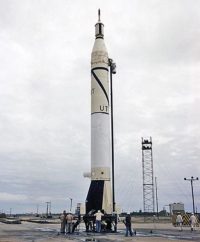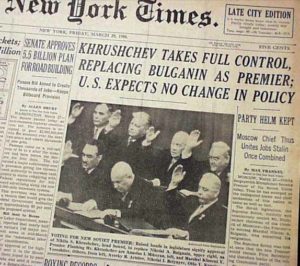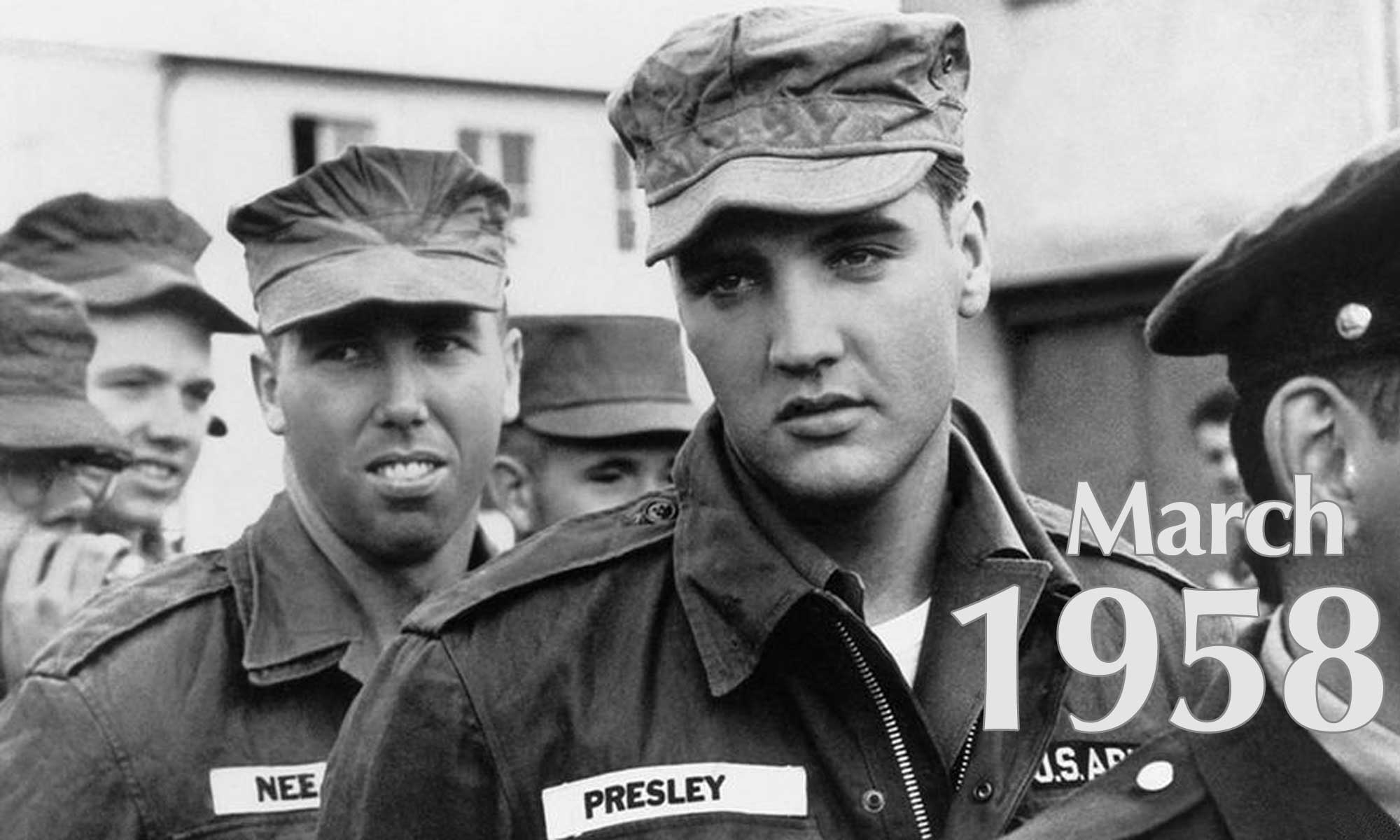| ◄ MARCH ► | ||||||
|---|---|---|---|---|---|---|
| ◄ 1958 ► | ||||||
| 1 | ||||||
| 2 | 3 | 4 | 5 | 6 | 7 | 8 |
| 9 | 10 | 11 | 12 | 13 | 14 | 15 |
| 16 | 17 | 18 | 19 | 20 | 21 | 22 |
| 23 | 24 | 25 | 26 | 27 | 28 | 29 |
| 30 | ||||||
| President: | Dwight D. Eisenhower (R) | |||
| Vice-President: | Richard M. Nixon (R) | |||
| House: | 233 (D) | 197 (R) | 0 (Other) | 5 (Vacant) |
| Southern states: | 99 (D) | 7 (R) | ||
| Senate: | 49 (D) | 47 (R) | ||
| Southern states: | 22 (D) | |||
| GDP growth: | -2.0 % | (Annual) | Recovering from | |
| 0.7 % | (Quarterly) | recession. | ||
| -3.0 % | (Since 2Q1957) | |||
| Fed discount rate: | 2¾ % | |||
| Inflation: | 3.6 % | |||
| Unemployment: | 6.7 % | |||
![]() Mar 6: The Army launches a second Explorer satellite, but it goes missing after an apparently successful launch. The Army will learn that the final stage fails to ignite, and the satellite plunges back to earth.
Mar 6: The Army launches a second Explorer satellite, but it goes missing after an apparently successful launch. The Army will learn that the final stage fails to ignite, and the satellite plunges back to earth.
![]()
 Mar 6: President Eisenhower opts against accelerating development of nuclear-powered aircraft. Rep. Melvin Price (D-IL) denounces the decision, saying it “opens the door wide to the prospect that the Russians will once again administer a humiliating defeat to the United States by placing the first nuclear-powered aircraft in the skies.” He predicts the Soviets will launch an atomic plane in eighteen months.
Mar 6: President Eisenhower opts against accelerating development of nuclear-powered aircraft. Rep. Melvin Price (D-IL) denounces the decision, saying it “opens the door wide to the prospect that the Russians will once again administer a humiliating defeat to the United States by placing the first nuclear-powered aircraft in the skies.” He predicts the Soviets will launch an atomic plane in eighteen months.
![]() Mar 6: The Federal Reserve cuts the discount rate from 2¾% to 2¼%. The discount rate is the interest rate the Fed charges member banks. This is the third reduction in the discount rate since the start of the current recession.
Mar 6: The Federal Reserve cuts the discount rate from 2¾% to 2¼%. The discount rate is the interest rate the Fed charges member banks. This is the third reduction in the discount rate since the start of the current recession.
![]()
 Mar 8: The U.S. Navy mothballs the U.S.S. Wisconsin, leaving the U.S. without a battleship on the seas for the first time since 1895. Battleships are seen as obsolete as aircraft carriers become the backbone of the Navy, but Congress will keep the Wisconsin and three others ready for reactivation. The Wisconsin, which was launched in 1943, will be reactivated in 1986 on orders from President Ronald Reagan. It won’t be fully retired until 2009.
Mar 8: The U.S. Navy mothballs the U.S.S. Wisconsin, leaving the U.S. without a battleship on the seas for the first time since 1895. Battleships are seen as obsolete as aircraft carriers become the backbone of the Navy, but Congress will keep the Wisconsin and three others ready for reactivation. The Wisconsin, which was launched in 1943, will be reactivated in 1986 on orders from President Ronald Reagan. It won’t be fully retired until 2009.
 Mar 10: New York’s WABD-TV airs a discussion of male homosexuality. The discussion takes place on Channel 5’s public affairs program Showcase at 1:00 p.m. The producer had contacted Tony Segura, the New York chapter president of the Mattachine Society, about coming onto the program. Segura agreed, on the condition that his name isn’t mentioned and he can wear motorcycles goggles while on the air. Those precautions are important: homosexuality is a felony in New York, punishable with of up to twenty years in prison. The program dealt mainly with dispelling some of the stereotypes about gay people, a task that is made difficult by Segura’s invisibility.
Mar 10: New York’s WABD-TV airs a discussion of male homosexuality. The discussion takes place on Channel 5’s public affairs program Showcase at 1:00 p.m. The producer had contacted Tony Segura, the New York chapter president of the Mattachine Society, about coming onto the program. Segura agreed, on the condition that his name isn’t mentioned and he can wear motorcycles goggles while on the air. Those precautions are important: homosexuality is a felony in New York, punishable with of up to twenty years in prison. The program dealt mainly with dispelling some of the stereotypes about gay people, a task that is made difficult by Segura’s invisibility.![]()
 Mar 11: A B-47 bomber accidentally drops an atom bomb on Mars Bluff, South Carolina. Without a fissile warhead, its conventional explosives destroy a house and injure several people.
Mar 11: A B-47 bomber accidentally drops an atom bomb on Mars Bluff, South Carolina. Without a fissile warhead, its conventional explosives destroy a house and injure several people.
![]() Mar 12: Cuban President Fulgencio Batista suspends Constitutional freedoms and imposes censorship on domestic and foreign media. Batista acts in the face of increasing rebel activities in the provinces and the threat of a general strike.
Mar 12: Cuban President Fulgencio Batista suspends Constitutional freedoms and imposes censorship on domestic and foreign media. Batista acts in the face of increasing rebel activities in the provinces and the threat of a general strike.
![]() Mar 15: The recession is being felt the hardest in Michigan, where the state’s unemployment rate stands at 14.3%. In metropolitan Detroit, 15.1% are out of work. Gov. G. Mennen Williams (D) calls the situation “a major economic disaster.”
Mar 15: The recession is being felt the hardest in Michigan, where the state’s unemployment rate stands at 14.3%. In metropolitan Detroit, 15.1% are out of work. Gov. G. Mennen Williams (D) calls the situation “a major economic disaster.”
![]()
 Mar 17: The U.S. Navy successfully launches its second satellite, Vanguard 1. The spherical satellite, only 6.4 inches in diameter and weighing just 3¼ pounds, is derided by Soviet leader Nikita Khrushchev as a “grapefruit satellite.” Vanguard 1 is the first satellite to be solar-powered. It’s also the first satellite to contain an on-board memory device: a tape recorder that records radiation measurements that is later transmitted back to earth. The satellite will continue to perform until 1964. Sixty years later, Vanguard 1 and its upper launch stage will be the oldest man-made objects still orbiting the earth. By continually measuring deviations in its orbit, scientists will be able to compile sixty years worth of baseline data on the Earth’s outer atmosphere.
Mar 17: The U.S. Navy successfully launches its second satellite, Vanguard 1. The spherical satellite, only 6.4 inches in diameter and weighing just 3¼ pounds, is derided by Soviet leader Nikita Khrushchev as a “grapefruit satellite.” Vanguard 1 is the first satellite to be solar-powered. It’s also the first satellite to contain an on-board memory device: a tape recorder that records radiation measurements that is later transmitted back to earth. The satellite will continue to perform until 1964. Sixty years later, Vanguard 1 and its upper launch stage will be the oldest man-made objects still orbiting the earth. By continually measuring deviations in its orbit, scientists will be able to compile sixty years worth of baseline data on the Earth’s outer atmosphere.
![]() Mar 17: The Champs’ single “Tequila” begins its five week run at the top of the charts.
Mar 17: The Champs’ single “Tequila” begins its five week run at the top of the charts.
![]() Mar 19: The film South Pacific is released. It will go on to become the top-grossing film of the year.
Mar 19: The film South Pacific is released. It will go on to become the top-grossing film of the year.
![]() Mar 24: Elvis Presley is inducted into the U.S. Army.
Mar 24: Elvis Presley is inducted into the U.S. Army.
![]()
 Mar 26: The U.S. Army launches the Explorer III satellite, but because the last three stages don’t fire correctly, the satellite winds up in the wrong orbit and will burn up on re-entry in June. Its abbreviated mission will confirm the presence of the Van Allen radiation belt.
Mar 26: The U.S. Army launches the Explorer III satellite, but because the last three stages don’t fire correctly, the satellite winds up in the wrong orbit and will burn up on re-entry in June. Its abbreviated mission will confirm the presence of the Van Allen radiation belt.
![]()
 Mar 27: Nikita Khrushchev officially becomes Premier of the Soviet Union following Marshal Nikolai Bulganin’s resignation. Khrushchev already held the title of General Secretary of the Communist Party, which effectively made him the leader of the Soviet Union. This latest appointment marks a further consolidation of power after Stalinists tried and failed to oust him the previous summer.
Mar 27: Nikita Khrushchev officially becomes Premier of the Soviet Union following Marshal Nikolai Bulganin’s resignation. Khrushchev already held the title of General Secretary of the Communist Party, which effectively made him the leader of the Soviet Union. This latest appointment marks a further consolidation of power after Stalinists tried and failed to oust him the previous summer.
![[Emphasis Mine]](http://jimburroway.com/wp-content/uploads/2018/01/Gay_Rights_demonstration_NYC_1976.jpg)
